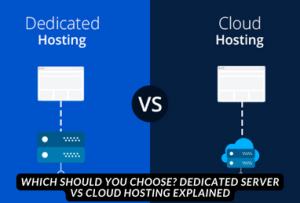Advertisement
Understanding the Difference Between a Dedicated Server and Cloud Hosting
If you’re in the market for web hosting, you’ve likely seen references to both dedicated servers and cloud hosting. But which should you use? Let’s break it down.
A dedicated server is exactly that—a physical server that’s “dedicated” to your project or application. You’ll be the only user of the server, so you’ll have complete control over its resources, including RAM, hardware, bandwidth and system software. This provides an additional level of security, as the server isn’t shared with other users.
Advertisement
In contrast, cloud hosting is a distributed platform that allows multiple users to access remotely hosted servers simultaneously. It makes use of virtual servers, which are stored in data centers across the globe and can be scaled up as required. Cloud hosting provides redundancy and high availability by automatically failing over to another server if one fails or experiences high load.
The Advantages of Dedicated Servers
So why should you choose a dedicated server over cloud hosting? Well, there are several advantages you should consider.
Advertisement
Advertisement
Advertisement
First, dedicated servers provide you greater control and security since there are no other external users on your server. This means that you have the power and sole authority over what happens on that server and with the data that is stored inside.
Second, dedicated servers can be tailored to your needs, allowing for customization and personalization of the hardware and software configurations without affecting any of the other users.
Third, dedicated servers generally can provide higher performance since they are not competing with any other resources. With greater processing power, memory, and storage capacity, they can be able to handle more demanding applications than cloud-hosting solutions.
Finally, with a dedicated server solution, you typically pay only for what you need. This helps minimize the costs associated with running such a system while still getting all the advantages it provides.
The Benefits of Cloud Hosting
Cloud hosting has its advantages; it’s likely to offer more scalability, virtualization, and automated usage tracking. If you’re not quite sure on the number of resources you’ll need for your website or app, then cloud hosting is a great option.
So what exactly are the advantages of cloud hosting?
Scalability
The biggest benefit of cloud hosting is scalability. Cloud-hosted websites are easily able to adjust their resource needs in response to user demand, making them more cost-efficient than dedicated servers. This means your website won’t crash when traffic suddenly spikes, and you don’t have to pay for resources you don’t use.
Virtualization
Cloud hosting is often based on virtualized technology which makes it easy to quickly spin up new applications and workloads in a few minutes instead of days or weeks with dedicated hardware. With virtualization, multiple resources can be managed from one central console, making it easy to maintain and manage your IT environment without hiring a dedicated IT team.
Automated Usage Tracking
Cloud providers are able to track usage using automated tools which makes it easier to understand how much bandwidth and storage you’re using. This makes it easier for you to monitor costs and take proactive measures if your usage exceeds your budget.
Factors to Consider When Choosing a Hosting Plan
When deciding between a dedicated server and cloud hosting, there are several factors to consider. Chief among these is cost. Dedicated servers typically require more upfront and ongoing expenses than cloud hosting does.
Also, consider the resources you need for your website. Dedicated servers offer more RAM, CPU speed and bandwidth than cloud hosting does. However, if you don’t need these resources for your project, you may find yourself paying for them unnecessarily.
In addition to cost and resources, another factor to consider when choosing a hosting plan is user control and scalability. With a dedicated server you have full root access and can customize your environment as desired even with complex languages such as Java or Python. On the other hand, while cloud hosting offers good scalability, it may be less customizable than dedicated servers.
Whichever option you decide on, make sure it meets both your current needs and that of any upcoming projects you have planned — that way you won’t have to switch plans or providers later on down the line.
Cost of Setting Up and Maintaining a Dedicated Server
When it comes to setting up and maintaining a dedicated server, things can get expensive. Dedicated servers offer more performance, but you’ll have to pay for it—they typically require substantial upfront investment to purchase the server hardware, plus labor costs for installation and maintenance.
Costs of setting up a dedicated server
Depending on the size and complexity of your setup, setting up a dedicated server can cost anywhere from thousands of dollars just to set up the hardware. Then there’s the software to add—you may need additional licensing fees or another third-party service provider. Plus, you’ll need to consider ongoing space rental costs and cooling/power costs.
Costs of maintaining a dedicated server
Maintaining your own hardware also means you (or your IT team) are responsible for all updates, patches and security maintenance. This can be time consuming as well as costly—you’ll need technicians on call 24/7 should any issues arise with the physical hardware or software itself. That’s why many companies opt for managed dedicated hosting services—having someone else take care of all the technical stuff for you can be a big money saver in the long run!
Cost of Setting Up and Maintaining a Cloud Hosting System
When it comes to cost, both dedicated servers and cloud hosting systems have their benefits and drawbacks. On the one hand, dedicated servers may require a large upfront cost for hardware, as well as ongoing maintenance costs. On the other hand, cloud hosting systems are often much cheaper to set up and easier to maintain over time.
So what’s the difference? With dedicated servers, you will need to purchase hardware that can handle your usage needs. You will then need an IT team to install and maintain this hardware. This can be expensive over time and takes a lot of time and energy to manage.
For cloud hosting, on the other hand, you don’t need to purchase any hardware—you just sign up with a provider who can provide you with a preconfigured cloud environment that you can use for your website or application. This eliminates the need for an IT team and is often much cheaper than dedicated servers in terms of setup costs. In addition, it’s also much easier to scale up or down according to your needs — all you have to do is pay for the additional resources as needed.







